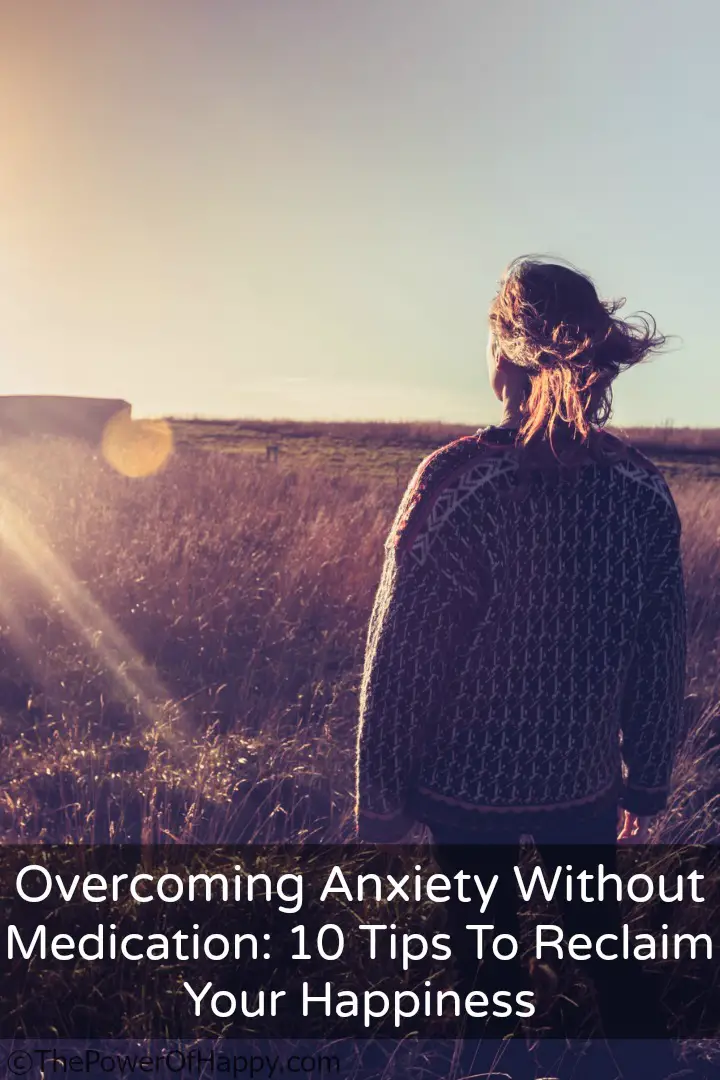Overcoming Anxiety Without Medication: 10 Tips To Reclaim Your Happiness
It is possible to overcome anxiety without medication. In fact, according to much modern research, medications are not the answer for most people – they come with debilitating side effects that often go unattributed to the medication. For more details on this see A Mind of Your Own by Kelly Brogan, MD.
Still, anxiety can be a terrifying thing for anyone as frightening thoughts and panic can take over and also come with extreme physical symptoms. It can make you think you are suffering from a heart attack or an unknown illness – it feels like something is surely physically wrong with your body. It can be debilitating and degrade your sense of happiness and wellbeing.
For a person living with anxiety, getting through the day is a feat in and of itself. Both the person’s mind and body are affected by anxiety. Likewise, it is becomes a vicious circle, with incessant worry and panicky thoughts, rapid heartbeat or shakiness. The thoughts can trigger these types of physical symptoms which lead to more panicky thoughts and more physical symptoms. It can be a challenge to break free of the pattern.
If you are among the millions people struggling with anxiety, the great news is that you can start feeling better even without using medication. The first step is to read this article. If you want more information, we highly recommend the book listed above – A Mind of Your Own.
Nonetheless, if your symptoms are severe, please consult a healthcare professional for proper treatment advice, preferably a functional practitioner trained in treating anxiety with natural methods.
Overcoming Anxiety Without Medication: 10 Tips To Reclaim Your Happiness
1. Analyze your food intolerances.
Most people don’t realize it, but food intolerances lead to anxiety. Many people who come across this information and eliminate the top offenders find that their anxiety is greatly reduced within a matter of weeks.
The top offenders are gluten and wheat, dairy, eggs, corn, grains and soy.
See: How To Do An Elimination Diet from GlutenIntoleranceInformation.com.
2. Get rid of the sugar immediately.
Sugar has now been linked to anxiety, depression and other mood disorders. Many people don’t realize just how much sugar they are eating and most don’t realize that it is contributing to their anxiety.
Sugar can be hard to quit. If you want to reduce your anxiety, however, it is well worth it. Cravings normally subside within a few weeks and it becomes easy. See the book I Quit Sugar for help.
3. Reduce inflammation.
We are not learning that anxiety often stems from systemic inflammation within the body. Reduce inflammation and see if your anxiety subsides. See Get Rid of Chronic Inflammation By Changing the Way You Eat from The Health Flash.
4. Practice breathing exercises.
Learning proper breathing techniques can greatly help ease your anxiety. For instance, breathing from your diaphragm–slowly–and taking in full, deep breaths can make you feel calmer. Breathing from your chest or lungs, instead of your abdomen, can make you feel more nervous and stressed out.
Likewise, there are a variety of deep breathing exercises that can be helpful. These include alternate nostril breathing, kundalini breathing, box breathing and other breathing techniques where you breathe in for a slow count, hold the breath and breathe out for a slow breath.
5. Get moving.
Your body produces extra energy when it is anxious. Use that energy by moving your body so that the energy will not have a chance to build up and cause you even more anxiety. Get up and take a walk to release your body’s excess adrenaline.
Refer to the book Spark by John Ratey which details how physical exercise or activity can be just as effective as the Zoloft prescription in managing anxiety.
6. Reduce your stress.
This one might seem obvious, but it is amazing how many people don’t work to reduce their stress. Figure out simple things you can do to plan ahead or avoid stressful situations.
7. Try out some natural remedies.
Turmeric, apple cider vinegar, magnesium, vitamin c and others have all been shown to help many people cope with and reduce their anxiety. Likewise, activities such as walking and yoga have helped people come out of anxiety. Try these out and find what may work for you.
8. Eliminate anxiety triggers.
Similar to sugar, alcohol and caffeine can lead to chronic anxiety. Likewise, many prescription drugs have been said to cause anxiety. This is true of anti-depressants and anti-anxiety medications. See A Mind of Your Own by Dr. Kelly Brogan, MD for more details on this. Further, even certain supplements can cause anxiety in some. For example, some people simply can’t handle certain B vitamins. Analyze your daily routine and see if there are anxiety triggers in there.
9. Sleep.
Adequate sleep is essential to all our health functions and especially true for keeping anxiety at bay. Without adequate sleep, anxiety quickly creeps in and takes over.
10. Other things you can do.
- Distract yourself. It is almost impossible to think about negative thoughts and feel jittery when you are actually busy doing something. Actively engage in a healthy or productive activities like watching a good film, playing a game, or doing something that needs your full attention so your nervousness starts to wane out.
- Imagine the stop sign. Visualize a huge stop sign the moment you realize you are starting to have anxious thoughts again. The stop sign will actually signal your mind to stop. You can also tell yourself “STOP.”
- Allow yourself some worry time. Set aside a few minutes each day to worry about things, making sure to do it only at that particular time. As you do this regularly, you will start worrying less throughout the day. By allowing yourself to be anxious for just a brief time, you can actually begin to learn to control your mind to worry less.
- Network with others. Talking to other people more can give you that sense of being “normal” again. It can also help you find more solutions to your problem. At the same time, you are overcoming your fear of talking to people so start reaching out to others more.
- Learn to sit still. If you often find yourself moving about from a panic attack or an anxiety episode, try your best to be calm and stay where you are. Use some relaxation techniques such as deep breathing to feel more at ease. It may feel that the anxiety is getting worse each second, but by sitting still and breathing in and out, you can set your mind and body to relax more. Learning how to do this technique regularly can also make you feel more confident and prepared the next time you come face to face again with anxiety.
- Learn more about anxiety. Knowing more about your condition can give you a better understanding of what you are dealing with. Indeed, it is difficult to fight a battle that you don’t really understand. Educate yourself by reading books or even watching videos about anxiety.
__
You can definitely deal with anxiety without medication. No matter how long you have been living anxiety, there are things you can do to help control it. Use the techniques above to help you feel more calm and happy on a regular basis. Soon you will realize that it is YOU who is in control and not your anxiety.

